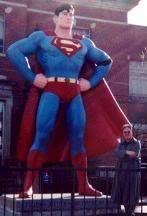| Pop Culture Gadabout | ||
|
Saturday, December 27, 2008 ( 12/27/2008 11:17:00 AM ) Bill S.  "YOU'RE BETTER OFF JUST BROKE!" Now that we're officially in a real recession, I thought I'd spend part of my holiday time viewing a genuine curiosity from 1933, the MGM comic operetta Hallelujah, I'm A Bum! A musical vehicle for Al Jolson, the film boasts a libretto by Richard Rogers & Lorenz Hart - and a very of-its-day plotline that lightheartedly jokes about poverty and socialism and even features Harry Langdon as a Marxist street cleaner. Prior to my viewing this film on DVD, I was mainly familiar with Jolson from The Jazz Singer, a historical landmark in moviemaking but an excruciating film to actually experience. Watching his more easygoing performance in Hallelujah, I can see why the man was a sought after property: tamped down by director Lewis Milestone, he's much more engaging. "YOU'RE BETTER OFF JUST BROKE!" Now that we're officially in a real recession, I thought I'd spend part of my holiday time viewing a genuine curiosity from 1933, the MGM comic operetta Hallelujah, I'm A Bum! A musical vehicle for Al Jolson, the film boasts a libretto by Richard Rogers & Lorenz Hart - and a very of-its-day plotline that lightheartedly jokes about poverty and socialism and even features Harry Langdon as a Marxist street cleaner. Prior to my viewing this film on DVD, I was mainly familiar with Jolson from The Jazz Singer, a historical landmark in moviemaking but an excruciating film to actually experience. Watching his more easygoing performance in Hallelujah, I can see why the man was a sought after property: tamped down by director Lewis Milestone, he's much more engaging.The movie centers on Jolson's Bumper, a happily unemployed hobo ("I get great enjoyment from unemployment," he sings in the title song) also known as the Mayor of Central Park. Palling around with a black hobo named Acorn (Edgar Connor), Bumper is the unofficial leader of the transients who make the park their home. He is also chummy with the real NYC mayor (a surprisingly debonair Frank Morgan), who regularly slips Bump a buck or two on his way to the Central Park Casino. Morgan's Mayor Hastings is carrying on a tempestuous romance with a woman from his office named June (Madge Evans); his unreasoning jealousy over the fact that he once saw her platonically embracing another man drives him into breaking off their relationship. A heartbroken June runs off to Central Park, where she despondedly jumps off a bridge and is rescued by our hero. Bumper pulls her from the water, but when she comes to, she's lost her memory. ("You ever hear of a thing called amnesia or aphasia?" Bumper asks. "I don't know which one it is, but you've got one of 'em!") The instantly smitten hobo turns his life around to take care of his "Angel," even going so far as to get an actual job at a bank so he can pay her rent. But what, we wonder, will happen when June regains her memory? A pretty slight story (credited to the prolific Ben Hecht), but what makes the movie truly unusual is its status as "the first picture even done in rhythmic dialog!" Much of the talking's done in syncopated patter crafted by Rodgers & Hart, who have a small cameo as a pair of newspaper photogs. Musically, the results are largely unmemorable, but the dialog can be amusing, specifically in two sequences devoted to mock trials held by the Central Park bums. The flick is also worth noting for the appearance of two silent film comedians, Langdon and mustachioed Chester Conklin as a carriage driver. Langdon's Egghead is a particularly arresting creation. Railing against the park bums' indolence and the "plutocrat" rich (first time he sees the amnesiac June, he charges, "She dresses like a capitalist!"), he nonetheless comes across as engagingly harmless and loyal to his friends. Hard to imagine a similar character being treated much the same way in any other era in movie history. Hallelujah reportedly didn't do well at the box office - in part, I suspect, because its ending doesn't follow the usual musical romantic comedy dictates. When June gets her memory back, we wait for her to remember her time spent with her goodhearted rescuer, only it never happens. Still, director Milestone (better known for All Quiet on the Western Front and The Front Page) includes some sharp visual moments for those fascinated by Depression Era cinema. In one sequence, our hero temporarily comes into possession of a thousand dollar bill, which throws his Central Park community into a greedy frenzy. The subsequent montage of demanding hobo faces looks as grim as anything directed by Fritz Lang, though, happily, Jolson defuses this volatile situation with a song. In a later scene, we're shown Bumper and his tagalong buddy Acorn at their short-lived bank jobs. We're introduced to them through an extended tracking shot which starts at one end of the bank where two millionaires are talking, moves down to considerably less flush bank customers and then slides over to the tellers who don't have a spare buck to their name. The more things change . . . MGM's DVD, which was released back in 2002 and currently can be gotten fairly cheaply, is a no-frills affair. Picture quality is pretty high for a largely forgotten early '30s artifact, though the sound is flatter than it should be, particularly for a musical. But this is the movie I'll want to think of when I remember Al Jolson: an appealing performance - and not a single frame of blackface to be found! Labels: obscuro comedies # | |
|
|

